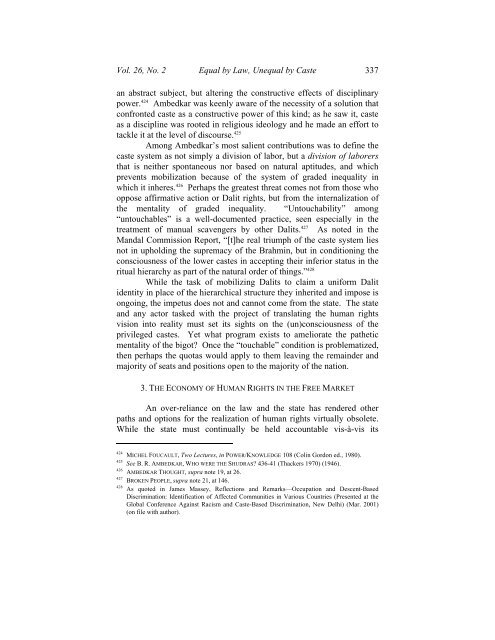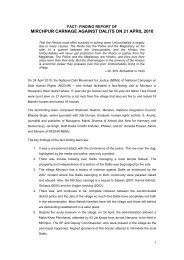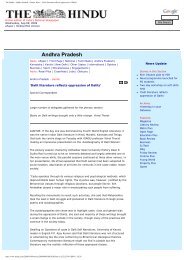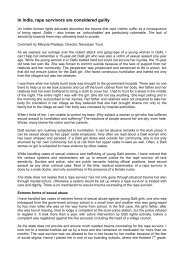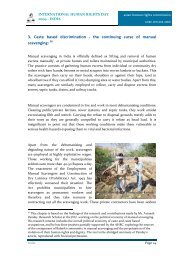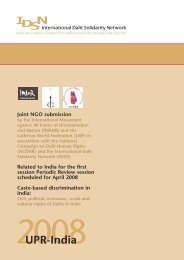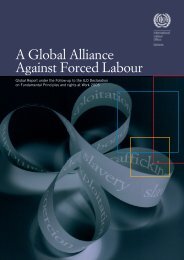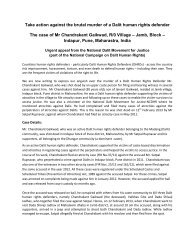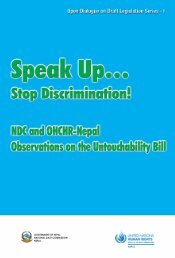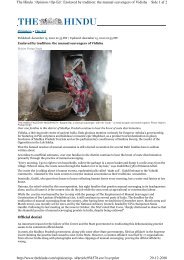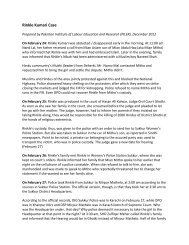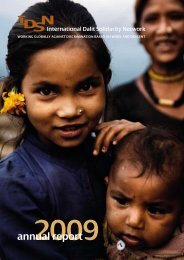equal by law, unequal by caste - International Dalit Solidarity Network
equal by law, unequal by caste - International Dalit Solidarity Network
equal by law, unequal by caste - International Dalit Solidarity Network
Create successful ePaper yourself
Turn your PDF publications into a flip-book with our unique Google optimized e-Paper software.
Vol. 26, No. 2 Equal <strong>by</strong> Law, Un<strong>equal</strong> <strong>by</strong> Caste 337an abstract subject, but altering the constructive effects of disciplinarypower. 424 Ambedkar was keenly aware of the necessity of a solution thatconfronted <strong>caste</strong> as a constructive power of this kind; as he saw it, <strong>caste</strong>as a discipline was rooted in religious ideology and he made an effort totackle it at the level of discourse. 425Among Ambedkar’s most salient contributions was to define the<strong>caste</strong> system as not simply a division of labor, but a division of laborersthat is neither spontaneous nor based on natural aptitudes, and whichprevents mobilization because of the system of graded in<strong>equal</strong>ity inwhich it inheres. 426 Perhaps the greatest threat comes not from those whooppose affirmative action or <strong>Dalit</strong> rights, but from the internalization ofthe mentality of graded in<strong>equal</strong>ity. “Untouchability” among“untouchables” is a well-documented practice, seen especially in thetreatment of manual scavengers <strong>by</strong> other <strong>Dalit</strong>s. 427 As noted in theMandal Commission Report, “[t]he real triumph of the <strong>caste</strong> system liesnot in upholding the supremacy of the Brahmin, but in conditioning theconsciousness of the lower <strong>caste</strong>s in accepting their inferior status in theritual hierarchy as part of the natural order of things.” 428While the task of mobilizing <strong>Dalit</strong>s to claim a uniform <strong>Dalit</strong>identity in place of the hierarchical structure they inherited and impose isongoing, the impetus does not and cannot come from the state. The stateand any actor tasked with the project of translating the human rightsvision into reality must set its sights on the (un)consciousness of theprivileged <strong>caste</strong>s. Yet what program exists to ameliorate the patheticmentality of the bigot? Once the “touchable” condition is problematized,then perhaps the quotas would apply to them leaving the remainder andmajority of seats and positions open to the majority of the nation.3. THE ECONOMY OF HUMAN RIGHTS IN THE FREE MARKETAn over-reliance on the <strong>law</strong> and the state has rendered otherpaths and options for the realization of human rights virtually obsolete.While the state must continually be held accountable vis-à-vis its424 MICHEL FOUCAULT, Two Lectures, in POWER/KNOWLEDGE 108 (Colin Gordon ed., 1980).425 See B. R. AMBEDKAR, WHO WERE THE SHUDRAS? 436-41 (Thackers 1970) (1946).426 AMBEDKAR THOUGHT, supra note 19, at 26.427 BROKEN PEOPLE, supra note 21, at 146.428 As quoted in James Massey, Reflections and Remarks—Occupation and Descent-BasedDiscrimination: Identification of Affected Communities in Various Countries (Presented at theGlobal Conference Against Racism and Caste-Based Discrimination, New Delhi) (Mar. 2001)(on file with author).


